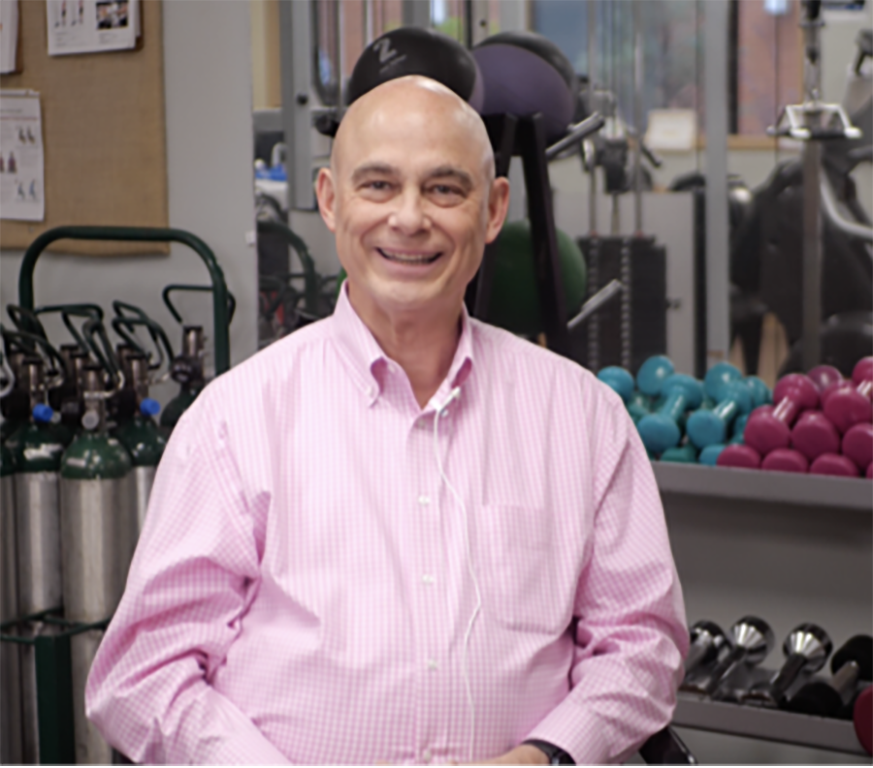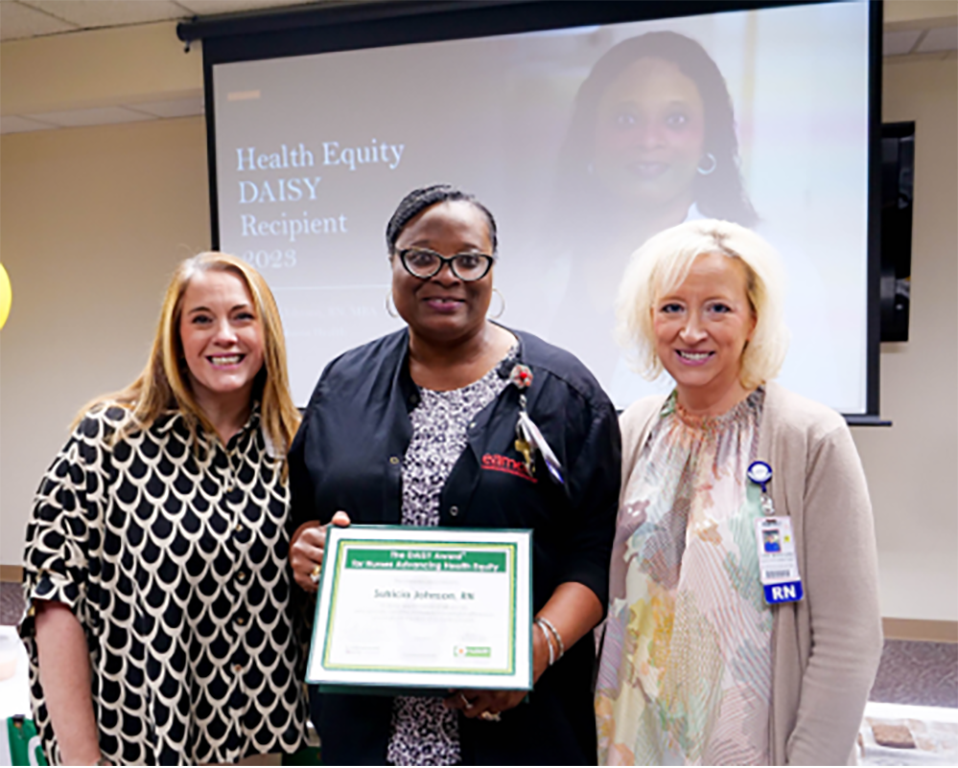CONTRIBUTED BY
EAST ALABAMA HEALTH
OPELIKA —
East Alabama Health is making a difference. One employee is expanding healthcare in underserved regions. In another area of EAH, calcium scoring is saving lives.
LENDING A HAND, SERVING A PURPOSE: JOHNSON EARNS DAISY AWARD FOR HEALTH EQUITY
When Sutricia Johnson was in nursing school, she was told she would never graduate due to the color of her skin. Almost three decades since graduating on the dean’s list, her efforts to expand access to health care for the underserved in Opelika have earned her the DAISY Foundation Award for Health Equity.
The award came in May during a surprise ceremony at East Alabama Medical Center for Johnson, which was attended by her family, her pastor, members from her church and numerous nurses and hospital officials.
Since December 2022, Johnson has led the Neighborhood Mobile Wellness Clinic, a collaboration between East Alabama Health (EAH) and the city of Opelika to bring health care to those who do not have the means of reaching it. Under her leadership, the mobile unit so far has provided over 250 health and wellness checks to more than 185 individuals.
“I said it when we launched the bus that Opelika means so much to me,” Johnson said. “This role is not a charge for me; it is a calling. I think about what the Bible says: ‘When you’ve done it unto the least of these, you’ve done it unto me.’”
Johnson’s philosophy in regard to helping those around her comes from her faith. She said she believes that her calling to help others was predestined.
“God didn’t give us our gifts to hold them to ourselves,” she said. “He gave us those gifts so that we can be His hands and feet.”
For Johnson, the effort to expand awareness and access to health care isn’t confined to the walls and wheels of the mobile wellness clinic.
During the days that the mobile wellness clinic is visiting neighborhoods in Opelika, she said she makes it a mission to walk through the neighborhood engaging and educating residents on the importance of health care, often befriending those she meets along the way.
“Even when people are skeptical about visiting the bus, she is able to convince them that they are important to us and that their health is a priority for us all,” said Shannon Jones, a social worker and mobile wellness clinic volunteer. “There have been many people who turn the rest of us down, but by the time Sutricia finishes, they are smiling and laughing and know they are part of something.”
Along with her work on the mobile wellness clinic, Johnson also serves as the director of Case Management at EAMC. In her role, she oversees a team of social workers and nurses dedicated to helping guide patients through their health care journey from hospital to home.
During Johnson’s surprise award ceremony, she received a hand-carved sculpture from Zimbabwe titled “A Healer’s Touch,” a DAISY Award certificate and a DAISY Award pin. Her coworkers also shared story after story through smiles and tears of what makes Johnson deserving of the award.
“Sutricia exemplifies the heart of what our EAMC mission is all about: reaching the underserved in our community with compassion and kindness,” said Dr. Steven Presley. “Throughout her work … she’s been a voice for the voiceless. I can’t think of anyone more deserving of this award.”
While Johnson said she appreciates the award and recognition, she added that it would make her happiest if everyone would use their gifts to help those around them in need.
“When moments like this come, you don’t expect it because this profession is not a job; it’s a calling,” Johnson said after receiving her award. “What would make me the happiest is for you all to use your resources to help care for those who cannot help themselves.”
CALCIUM SCORING SCAN HELPS SAVE LOCAL BANKER’S LIFE
In Robert Williams’ line of work as the market president of Cadence Bank, a score of 849 is practically perfect for a credit score. But when the technician who performed Williams’ calcium scoring scan revealed the results, the longtime banker could hear concern in the technician’s voice.
A few weeks earlier, Williams said he had never even heard of a calcium scoring scan. That changed when Merry Burt, a fellow member of the Opelika Rotary Club, stood up during their January meeting to tell everyone they should consider getting one.
“During our Rotary meeting, Merry stood up and said, ‘You all need to take a calcium test,’ and we all said, ‘What the heck is a calcium test?’” Williams recalled. “She explained that her husband, Larry, who took the calcium test without having any symptoms, had to have quadruple bypass surgery.”
A calcium scoring scan is a noninvasive CT scan that measures calcium buildup in the artery walls. The test effectively determines someone’s potential risk of having a sudden cardiac event, such as a heart attack.
Heeding Burt’s advice, Williams and a few other Rotary members scheduled calcium scoring scans at the Auburn Medical Pavilion. Since it was Heart Month (February), Williams and his friends took advantage of East Alabama Health’s (EAH) promotion offering calcium scans for $50, half the usual price.
“The machine went around for a couple of minutes taking photos of my heart, and then the tech had me look at the computer, which showed the calcium buildup in my heart,” Williams said. “That’s when the tech said, ‘Oh my, it’s 849,’ and immediately got on the phone with my internal medicine doctor, Dr. (Michael) Gunter.”
Williams’ score of 849 was more than double the score indicating cause for concern. Thus, his score indicated he needed to act quickly.
“The best score on one of these tests is zero, and they get a little giddy when it gets to 400,” Williams said.
Following the scan, he set up an appointment with Gunter, who, after reviewing his results, referred him to a cardiologist for a stress test.
Unfortunately, the stress test results revealed that Williams would need to have a heart catheterization procedure to place stents in his heart. At least, that was the plan until Dr. John Mitchell told him that while performing the procedure, he found Williams would not be able to have stents due to the severity of the blockage.
The only option left on the table was quadruple bypass surgery, and that led him to Dr. Barry Crowe, a cardiothoracic surgeon with Heart and Lung Surgeons of East Alabama who operates at East Alabama Medical Center.
“The blockage was a ‘widow maker,’ which is a bad place to be,” Williams said. “Dr. Crowe said I was a candidate to drop dead at any point because of the widow maker blockage.”
Williams, who grew up in Opelika and is an active member of the community, couldn’t fathom the thought of going elsewhere for his procedure and post-op care.
“I had friends ask, ‘Are you going to have it in Birmingham or Atlanta?’ and I said, ‘Why would I go somewhere else when we have great care here at EAMC?’” Williams said. “I have the comfort of knowing that I live, breathe, work, play and eat with all the people here, and they have a vested interest in seeing me get better.”
Everything went smoothly throughout the entire process, but Williams did have one concern.
“The nurses and doctors in pre-surgery did such a great job of educating my wife and me on the process, so that eased a lot of anxiety,” he said. “Quite frankly, I’d had four of my five shoulder surgeries in this hospital, and more than anything, I was worried about the anesthesia drug and what I might say or do.”
A few weeks after the procedure, Williams began cardiac rehab at EAMC. The 12-week program is an outpatient exercise and secondary prevention program that helps patients strengthen their heart after an event or procedure. It also helps educate patients on lifestyle choices that build and maintain a healthy heart.
Three mornings a week, Williams spends an hour exercising with cardiac rehab. He said the rehab program isn’t all work and can actually be fun.
“The cardiac rehab team is full of rock stars,” he said. “I actually feel a lot better at the end of each workout. They know that once you finish [the program], you are going to be better, and you’re going to do the things that you want to do.”

With the help of the cardiac rehab team, Williams is already starting to get back to doing the things he wants to do.
“One of the goals I had going in was to hit a golf ball again,” he said. “Well, this past Sunday, which was week nine, I hit a golf ball.”
For Williams, he recommends everyone get a calcium scoring scan regardless of if they have symptoms, as it could be the difference between life and death.
“The calcium test basically saved my life,” Williams said. “The calcium test saved my life, and the doctors and nurses are the ones who put my heart back together and made it so that I can stand upright and walk another day.”
ABOUT EAST ALABAMA HEALTH
East Alabama Health encompasses East Alabama Medical Center in Opelika, EAMC-Lanier in Valley, the Spencer Cancer Center in Opelika, the Auburn Medical Pavilion and a host of other key medical clinics and practices that help provide a continuum of care to patients throughout an 11-county area. EAMC is a 314-bed regional referral hospital with a 26-bed Skilled Nursing Facility, while EAMC-Lanier provides inpatient services as well as a nursing home, an acute rehab unit and an ambulatory surgery center. East Alabama Health employs about 3,500 people and is the second largest employer in the region, trailing only Auburn University. For more information, visit www.eastalabamahealth.org.


